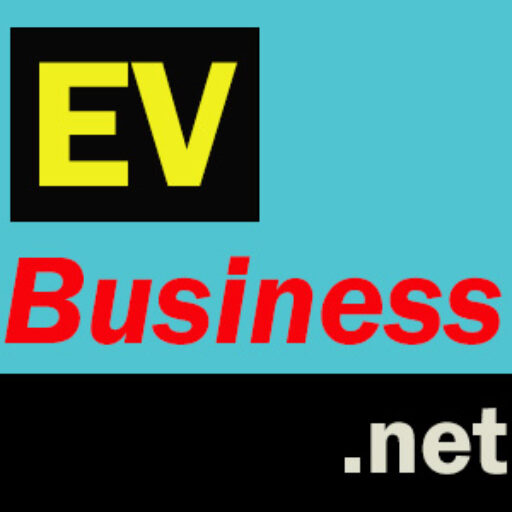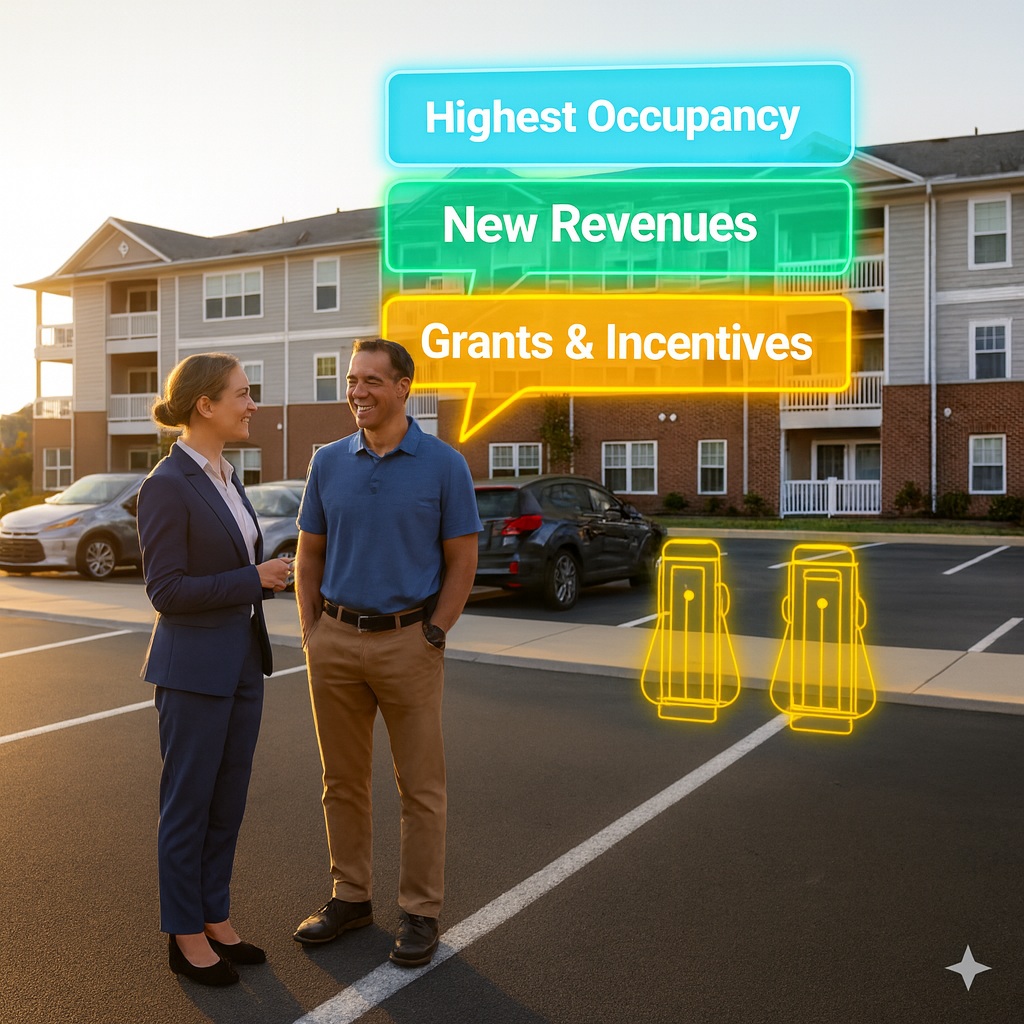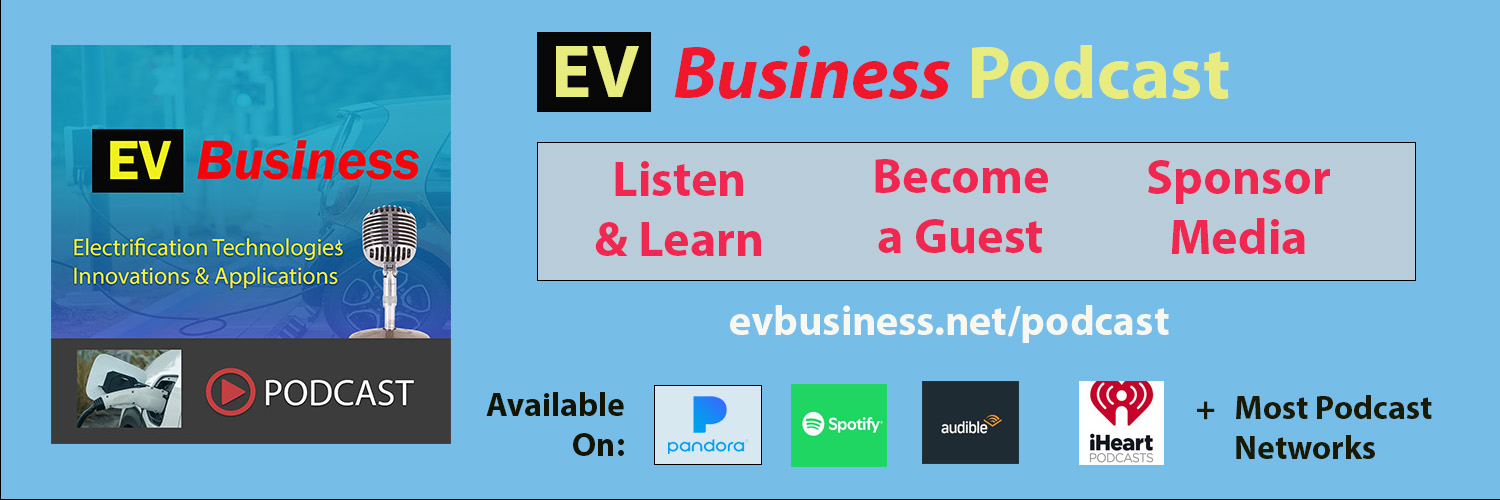By: Lawrence Harte
Marketing and selling EV charging systems to apartment complexes and multi-dwelling units (MDUs) is often seen as costly and complex. EV business development and sales agents can struggle to find and qualify candidates, receive rejections or no answers before being able to build a value trusted relationship, and have difficulty in getting prospects to commit to equipment and service purchases. The good news is that with the right strategies, tactics and media, you can rapidly generate qualified leads, develop value relationships and close sales deals.

You want to discover more about Marketing and Selling EV Charging Systems to Apartments and MDUs? Listen to the podcast session that this article summarizes – EVBusiness.net/114. Also available on Spotify, Pandora, Audible, iHeartRadio & other podcast networks.
Marketing vs. Selling EV Charging Systems
Marketing creates awareness and generates qualified leads for EV charging systems at apartments, while selling builds relationships, addresses objections, and converts those leads into closed deals and revenue.
Marketing and sales should be closely tied because aligned messaging, shared data, and coordinated timing turn awareness into action; a business development manager bridges both functions by ensuring that marketing generates qualified leads tailored to sales priorities and that sales feedback refines future marketing strategies.
Marketing EV Charging Systems
Successful EV Charging Systems marketing builds awareness and influence through LinkedIn campaigns, groups, webinars, direct mail, and targeted media campaigns. The goal is to educate and motivate property owners on financial and tenant benefits while generating qualified leads.
Main Objectives – Awareness, Influence and Qualified Leads
Successful programs combine LinkedIn campaigns, online discussion groups, webinars, direct mail, and targeted ads to reach property owners, asset managers, and facilities leaders where they already engage. The most effective strategies focus on solving real problems—such as avoiding costly electrical upgrades, managing resident access fairly, and leveraging incentives—while offering a clear next step like a 10-minute feasibility screen. Supporting tools such as budget calculators, checklists, case studies, and white papers turn complex decisions into low-risk, high-confidence actions. When paired with tenant advocacy and measurable advertising performance, these marketing methods consistently convert awareness into qualified leads and installed EV charging projects.
Linkedin Campaigns
LinkedIn campaigns are one of the most powerful tools for generating qualified apartment and MDU leads for EV charging projects because they reach active decision-makers such as owners, asset managers, and property managers. A successful strategy starts with a strong LinkedIn profile for the business development manager, clear customer profile types (personas), targeting the right mix of decision-makers, associates, and gatekeepers through precise titles, industries, and company sizes.
Create high-value offer campaigns—like budget ROI calculators, tutorials and lists of available grants and incentives —supported by clear, visual problem-solution messaging and frictionless lead gen forms to drive feasibility screen appointments. Track key performance indciators (KPIs), continually test new creative media and follow up rapidly using CRM-linked workflows to convert engagement into qualified opportunities and booked installations.
Discussion and Networking Groups
Apartment and multi-dwelling unit (MDU) decision-makers hang out in online discussion groups and business networking groups. Done right, these channels deliver qualified leads at low cost—because you’re showing up where problems are being discussed and bringing solutions, not ads.
Online group platforms include LinkedIn, Facebook, Reddit, and professional forums and coalitions. The goal of participation is to “teach, not pitch” by sharing practical insights on issues that matter to property professionals.
Start by finding, joining and observing groups to determine if the members, content and activities match your audiences. Participate in groups and become a trusted planner who removes friction. Explain why and how EV charging stations can be added without massive upgrades, how to manage access fairly, and how to capture incentives on time. Create your own group that focuses on a specific EV Charging Systems related topic area or geographic region. Owning a group helps you to discover and understand how groups work and what content and activities are acceptable.
Webinars
Webinars are one of the fastest ways to educate apartment decision-makers, surface real projects, and book feasibility calls—without traveling or fighting for conference slots. You can run practical and repeatable educational webinars to generate qualified MDU leads for EV charging projects.
A well-run webinar does three things: educates, reduces risk, and creates immediate next steps. Focus on the key challenges that owners and managers actually face—retention, revenue, rebates and risk reduction. Make the path to a quick feasibility screen obvious. Do that consistently, and webinars become your most scalable channel for MDU EV charging deals.
Effective webinar promotion and structure are essential for maximizing engagement. Campaigns typically begin three weeks prior, combining targeted emails, LinkedIn posts, association partnerships, and optional ads to drive attendance. Strong landing pages and reminders boost conversion, while clear calls to action (CTAs) such as “How to add 6–12 EV chargers without panel upgrades” reinforce the value proposition.
During the live event, use interactive elements—like polls, Q&A sessions, and downloadable handouts—to help maintain attention and surface real project leads. Post-webinar follow-up is where leads become opportunities. Send attendees recordings and resources. Provide no-shows with recap emails and invitations to future sessions.
Direct Mail
Direct mail still works and it can be very successful for hard-to-reach apartment owners, asset managers, and property management leaders who don’t respond to email, calls or other types of communication. When you use well targeted lists, useful high-value offers, and rapid follow-up, mail can open doors for EV charging projects at apartments and MDUs.
Direct mail works when it’s surgical, helpful, and connected to fast follow-up. Aim each piece at the real challenges—capacity, fairness, incentives—and offer a quick high value incentive to respond. Send 2–3 coordinated mailings (touches) and you’ll turn mailboxes into meetings—and meetings into installed EV charging at apartments.
Effective mailings include easy high-value calls to action like an invite to an event, free 10-minute feasibility screen, high-value resource or an interesting gift. Direct mail can be combined with rapid email or phone follow-up to turn curiosity into qualified meetings and installed charging systems.
Direct mail success depends on list quality and offer alignment. Accurate lists —such as apartment association directories, utility incentive lists, and local tax records—allow for precise segmentation by property type, unit count, and geographic incentive zone. Each mailing should feel personal and relevant, featuring property names, local incentive mentions, or nearby case studies. Direct mail should include trackable responses such as QR code or personalized web address (PURL).
Content Marketing
Content marketing is the creation and promotion of helpful tools and resources such as guides, case studies, white papers which can attract and motivate qualified leads. They can turn complex EV charging decisions at apartments/MDUs into clear, low‑risk next steps by packaging your expertise into practical tools and high‑trust resources (white papers, case studies, calculators, checklists).
When selling EV charging systems to apartments, discoverability, credibility and value win. Create useful tools such as a budget template, checklists and other resources (white papers, case studies, RFP template). Distribute them where owners and managers go and trust—business partners, associations and discussion groups. Create followup value and make the next step obvious: a free 10‑minute feasibility screen.
Tenant Promotion
Apartment and MDU tenants can be key drivers for the adoption of EV charging infrastructure. By helping them voice their demands effectively, property managers can be persuaded to see EV charging stations as both a tenant satisfaction tool and a profitable investment. For apartment owners and managers, these requests are not just tenant amenities—they represent an opportunity to increase property value, attract new residents, and meet regulatory expectations. With structured communication, economic framing, and measurable outcomes, marketing EV charging systems to apartment owners and managers becomes a tenant-driven win-win.
Use digital surveys and petitions to create measurable demand evidence. These requests provide owners with tangible evidence that there is both a need and a market advantage to installing EV charging systems.
Targeted Advertising
Advertising can be used to reach and influence apartment and MDU decision‑makers (owners, asset managers, property managers, facilities). To avoid wasted costs, use targeted digital ads to the right audiences with useful offers, measure and continually optimize your results. Targeted ads work for MDU EV charging when they identify real constraints, provide practical next steps and simplify how to followup and setup meeting opportunities.
Ad campaigns can address real challenges like electrical capacity, ROI, and maintenance concerns can effectively move prospects through a structured funnel of awareness, consideration, and conversion. Each ad should communicate value in seconds, resolve a pain point, and drive toward an actionable step such as a 10-minute feasibility screen.
Selling EV Charging Systems
Selling EV charging systems to apartment and multifamily property owners requires a professional, educational, and relationship-driven approach that builds trust and reduces perceived risk.
Main Objectives – Qualification, Relationship Value and Deals Closed
Telemarketing provides a fast, compliant way to reach decision-makers and book short feasibility screens that turn conversations into projects. Events help engage the full buying committee through problem-solving sessions that address real installation and incentive challenges, while demonstrations make technical solutions tangible by showing how chargers can be added without costly upgrades. Building long-term relationships through consistent value, clear communication, and stakeholder alignment transforms single-site wins into portfolio-wide expansion. Finally, effective negotiation and closing focus on balancing risk, scope, and cost—leading buyers through a clear, low-risk path to installation, predictable costs, and resident satisfaction.
Telemarketing
Telemarketing—done respectfully and professionally—can be one of the fastest and most effective ways to connect with apartment owners, asset managers, and property managers who are hard to reach via email. You can build compliant call programs, book feasibility screens, and turn conversations into EV charging projects.
Successful telemarketing in this space is simple: respect the prospect’s time, lead with a capacity‑without‑upgrade story, ask 2–4 smart questions, and always close for a 10‑minute feasibility screen. Measure connects → meetings → opportunities, continually test & optimize, and your calling program will consistently create a pipeline for EV charging projects at apartments.
Create and continually update your talking points (scripts). Tailor your messaging to different roles—owners care about ROI and incentives, property managers prioritize fairness and maintenance, and facilities directors focus on electrical capacity and reliability. Within 90 seconds, you must demonstrate clear value by framing the person’s pain points. Build value and trust by listening to their challenges and sharing tips and resources that will help them. Create a list of key objections and ways to interact and respond to them.
Events
Events can put you in the same room as the apartment buying committee—owners, asset managers, regional/property managers, facilities directors, HOAs/boards. You can attend and get invited to present or speak at events. Host problem‑solving sessions, not sales pitches, and you’ll consistently book feasibility screens and create a sales lead pipeline.
Events become truly high-intent when they address real apartment and MDU challenges in real time. Show attendees how to add EV chargers without costly service upgrades, calculate the financial benefits of demand-charge reductions and incentives, and make scheduling a quick 10-minute feasibility screen the natural next step. Boost your event’s value, credibility, and marketing impact by including guest speakers from utilities, system integrators, and property ownership groups who can share practical insights and success stories.
Relationship Building
Selling EV charging into apartments and MDUs isn’t a one‑call close—it’s a multi‑stakeholder journey that rewards patience, clarity, and consistent value. You should build value and trust with owners, asset managers, property managers, and facilities leaders so conversations turn into feasibility screens, projects, and portfolio‑wide expansion.
Relationships close EV charging deals at apartments. Lead with useful tools, document next steps with a MAP, respect each stakeholder’s priorities, and keep communication light and consistent. Execute the post‑install cadence, and one successful site becomes the case study that wins the portfolio.
The key to trust-building is providing value at every step of the buyer journey. Early-stage materials like readiness checklists and incentive snapshots build helpfulness; mid-stage proof such as case studies and ROI calculators establish credibility; and late-stage tools like implementation guides and sample policies position the vendor as a preferred partner. Communication should be brief but regular—emails, follow-ups, and short recaps that show respect for the buyer’s time while maintaining forward momentum.
Demonstrations
Demonstrations turn abstract EV charging talk into tangible outcomes for apartment and MDU decision‑makers. Run demos as problem‑solving sessions—not feature tours—and you’ll consistently book feasibility screens and move complex committees toward install decisions.
Great demos don’t “show features”—they solve the apartment problem in real time: fit more ports without upgrades, keep access fair, control demand charges, and move the committee to a low‑risk next step. Keep visuals minimal, make CTAs unavoidable, and measure success by feasibility screens and opportunities, not applause.
The goal is to make outcomes tangible: show how smart load management adds ports without service upgrades, prove operational fit (reservations, fair-use rules, billing, uptime/SLAs), quantify financials (capex ranges, incentives, demand-charge strategy), and drive a clear next step—a quick feasibility screen. Keep visuals to 3–5 essentials (one-line power flow, live load management view, reservation/billing screens, case snapshot, incentives chart) and match format to audience (on-site hardware for facilities, concise executive proofs for owners).
Negotiation
Selling EV charging into apartments/MDUs involves multiple stakeholders, permitting and electrical constraints, and can have long budgeting cycles. A disciplined negotiation process turns complexity into clarity, protects margin, and speeds time‑to‑install.
Successful negotiations in the MDU EV charging space focus on balancing risk, scope, and operations—not just price. The most effective approach is to anchor on shared outcomes such as maximizing capacity without upgrades, ensuring fair access, and maintaining predictable costs, while trading value for value across all parties. Establish a shared Mutual Action Plan (MAP) that clearly defines each stakeholder’s role, responsibilities, and milestones. When everyone is aligned around a transparent roadmap, you build trust, reduce friction, and close scalable, long-term deals that expand naturally from one property to the entire portfolio.
Closing Deals
Closing a deal in the apartment/MDU world is less about pressure and more about risk removal, stakeholder alignment, and a clear path to commissioning. If you have developed value, trust and urgency, turning qualified interest into signed scopes and scheduled installs is almost automatic.
Closers win in the MDU EV space by removing risk and work for the buyer: show how the project fits existing power, makes resident access fair, and keeps costs predictable—then lock an install week and walk the committee through a clear MAP. Keep urgency ethical (incentives, permits, scheduling), trade value for value, and measure success by signed scopes, scheduled installs, and fast time‑to‑commissioning.

About Lawrence Harte
Lawrence Harte is an EV technology and systems expert with deep expertise in marketing and sales. He is the author of Connected EVs Explained, EV Charging Systems for Apartments, and more than 150 other books on technology, media, and business. Lawrence is also the editor of EV Business Magazine, host of the EV Business Podcast, and publisher of the EV Industry Directory. With formal training in sales from Dale Carnegie, Tom Hopkins, Sandler Sales, and others, he brings both practical and academic insight to sales strategy.


